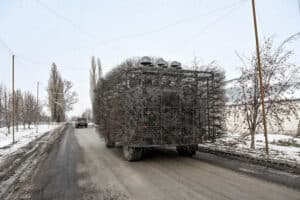Norway’s history with foreign occupation drives its support for Ukraine’s self-determination and resistance to Russia’s aggression.

Most nations in Europe thought we had left behind the era of war and invasion against neighbouring countries after World War II.
The 50 million dead in World War II birthed the UN Charter which was meant to stop wars between states.
For decades, the number of inter-state conflicts decreased.
Russia’s invasion of Ukraine takes us back to an era in which the state of play between countries is decided on the principle of “might is right”, meaning the strong can do as they wish, without consideration of morals, norms or laws, and can deprive independent countries of their self-determination and violate their sovereignty.
Like big, bellicose European powers in the past, Russia blames the war on Nato’s socalled expansion.
Norway has been a member since 1949. Like all the alliance members we joined it voluntarily after a democratic process.
ALSO READ: Donald Trump turns to X over Ukraine funding
Nato is a defensive alliance, and not a threat to anyone.
Today’s Russia, on the other hand, is an existential threat to its neighbours.
It was Russia that invaded parts of Georgia in 2008 and Ukraine in 2014 and 2022.
The rest of Europe does not accept Russia’s invasion, which is why Europe is united against its invasion.
Russia’s invasion of Ukraine is a gross violation of the UN Charter, something the UN secretary-general has made clear.
Ukraine has the right to defend itself from invasion under international law and basic moral principles.
ALSO READ: European countries vow to support Ukraine
Norway’s support to Ukraine is also in line with the UN charter. Norway does not accept that we, which shares a border with Russia, should live in the shadow of threats of invasion.
All countries, whether it is Norway, Ukraine or South Africa, have a right to self-determination.
As Norwegians, we know what foreign occupation is like.
That is one reason we supported African liberation movements politically and financially from the 1960s.
Today, Norway supports the self-determination of Ukraine and provides political and military support, as well as humanitarian and development aid.
We also support Palestine’s right to self-determination.
ALSO READ: SA’s foreign policy reaffirmed in principles of ‘active non-alignment’
As a small country, Norway has had to fight for its independence and recognition among the family of states.
On 17 May, 1814, we got our own constitution which was an act of rebellion against big European powers at the time who wanted to “hand over” Norway from Denmark to Sweden after the Napoleonic wars.
Norway rejected the notion that “might is right” at home and abroad ever since.
We only gained full independence in 1905.
However, our independence was threatened again during World War II when Norway was invaded by Nazi Germany.
Norway endured five terrible years of German occupation under a dictatorship propped up by 400 000 German soldiers.
ALSO READ: Schreiber claims ‘historic Ukraine visa agreement’, but Presidency denies authorisation
All over Europe, war, violence and death were Hitler’s instruments to gain power and grab territory.
Norway was liberated by the allied forces in May 1945.
Its freedom was achieved, in part, due to the Soviet Union, which suffered significant losses in liberating northern parts of the country.
The Soviet Union fought against Nazism, as did most European states and the US.
Norway has not forgotten this and, to this day, war memorials for fallen Soviet soldiers remain to demonstrate our gratitude and respect for their sacrifice.
The contemporary Kremlin leadership believed that they could easily dominate Ukraine, but the Ukrainian people are fighting for their self-determination, democracy and right to exist, just as Norwegians did during World War II under German occupation.
ALSO READ: The new ‘Cuban missile crisis’
Russia is our neighbour. Even during the Cold War, Norway engaged with the Soviet Union.
Nevertheless, Russia has broken the fundamental European and global norms for peaceful coexistence between neighbouring states. Liberal forces have been marginalised. Leading regime critics have been jailed or forced into exile.
Civil society and independent media have been silenced.
Neighbouring countries can flourish when democracy is sacrosanct and international law guides relations between states.
Today, Germany is one of our closest allies. Its record of democracy and commitment to uphold international law after World War II is impeccable.
Hopefully, we will be able to partner with a different Russia sometime in the future.
NOW READ: Brics: DA’s criticism of Ramaphosa on Russia being an ally ‘won’t affect GNU’ [VIDEO]
Support Local Journalism
Add The Citizen as a Preferred Source on Google and follow us on Google News to see more of our trusted reporting in Google News and Top Stories.






